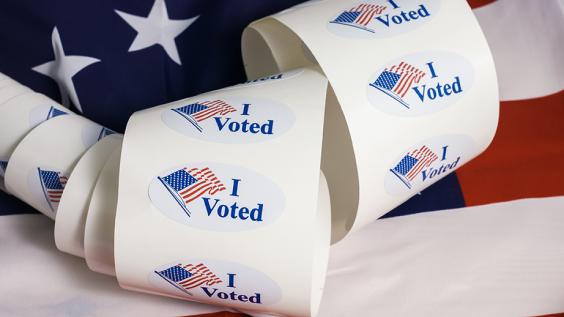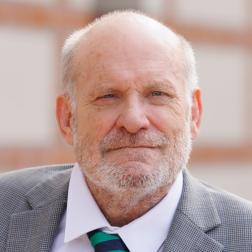Foreign Policy and the Presidential Election: The Democrats

Table of Contents
Author(s)
This blog is the first in a four-part series analyzing the role of foreign policy in the 2016 presidential election.
Well, it looks like it’s going to be Trump and Clinton in November. (Imagine saying that a year ago.)
Barring some electoral bolt out of the blue, the entrepreneur-cum-celebrity and U.S. senator-then-secretary of state will be vying for the presidency in what promises to be an — and I use the term precisely for its euphemism — interesting campaign. With Donald Trump’s almost certain nomination, we are moving into uncharted political waters. We are rather like those early mariners who, having come to the furthest reach of their charts, see only blank space and the warning “Here lie monsters.” (My use of “monsters” is a reference to the unknown, not the two candidates themselves, though partisans on both sides will no doubt beg to differ.) Love Trump or hate him, he is a species of candidate new to modern presidential elections. And his presence throws an element of uncertainty, to put it mildly, into the fall campaign.
What role has foreign policy played in the election to date? Let’s look at the Democrats first.
Sen. Bernie Sanders has clearly sought to differentiate himself from Hillary Clinton on the question of military intervention as an instrument of foreign policy. He has raised, repeatedly, then-Sen. Clinton’s support in 2002 for the invasion of Iraq. Clinton has publicly admittedly that her vote for war was a mistake. She has surely lived to regret it. Not only was the invasion a disaster for U.S. interests in the Middle East — costing thousands of U.S. lives and trillions of dollars with little to show for them — it also may well have proved the difference in Clinton’s close-fought battle for the Democratic nomination with then-Sen. Barack Obama in 2008.
Sanders has also assailed Clinton for her key role in promoting the ill-fated 2011 intervention in Libya during her tenure as secretary of state. He surely has a point. However high-minded the motives of the intervention, it left Libya in chaos. Clinton, it should be noted, has refused to admit that the intervention was a mistake, though she — like President Obama — has conceded that, in retrospect, it could have been managed more effectively. They — and other supporters of the intervention — really have little choice but to admit as much. Five years after the U.S. and NATO allies helped topple dictator Muammar al-Gaddafi from power, Libya remains mired in civil war and now serves as a fertile breeding ground for ISIS.
Sanders, it should be stressed, is not an isolationist. The term has long since become one of the most overused in our foreign policy lexicon; it is routinely deployed against those who take a less interventionist posture when it comes to foreign policy, particularly those who oppose the use of military force. If Sanders is an isolationist, he is surely a curious one. He supported the Clinton administration’s intervention in the Balkans; his position on Libya in 2011 was actually ambiguous; and today, he supports the Obama administration’s policy in Syria. But Sanders, even if no isolationist, surely stands to the “left” of Clinton on the question of intervention. And Clinton, in turn, stands to the “right” of Obama, if only slightly, on the same continuum.
Still, the Democratic primary campaign has focused more on domestic policy, notably the differences between Sanders and Clinton on issues as varied as health care, college finance and regulation of the banking sector. Perhaps most interestingly, Clinton and Sanders have conducted the equivalent of a tutorial on the nature of liberalism. Sanders has staked out an avowedly — at least by contemporary American standards — radical position on the need for far-reaching economic and political change. Clinton, in contrast, has touted her long record and pragmatic approach to improving the status quo at the margins. She is the unabashed voice of incremental liberalism; he the critic of what he and his supporters see as a liberal establishment that has sold its soul to corporate interests. This — as a gross oversimplification, the struggle between reformist versus radicals — is not new; indeed, it is a perennial fixture of politics on the left. But it has not been so starkly delineated in a recent presidential campaign.
Foreign policy has played a part in this debate, though, as noted, a modest one. One reason: neither candidate has appeared willing to put too much distance between her- or himself and Obama’s foreign policy. This no doubt reflects in part their broad agreement with the president’s cautious approach in the Middle East and elsewhere. Moreover, the president’s refusal to introduce major combat forces into either Iraq or Syria has removed one potential area of contention from the Democratic primary. But surely Obama’s high popularity with the Democratic electorate has also had something to do with the (relatively) subdued foreign policy debate between Clinton and Sanders.
Up next: the Republicans.
Joe Barnes is the Bonner Means Baker Fellow at the Baker Institute. From 1979 to 1993, he was a career diplomat with the U.S. State Department, serving in Europe, Africa, the Middle East and South Asia.
This material may be quoted or reproduced without prior permission, provided appropriate credit is given to the author and Rice University’s Baker Institute for Public Policy. The views expressed herein are those of the individual author(s), and do not necessarily represent the views of Rice University’s Baker Institute for Public Policy.

